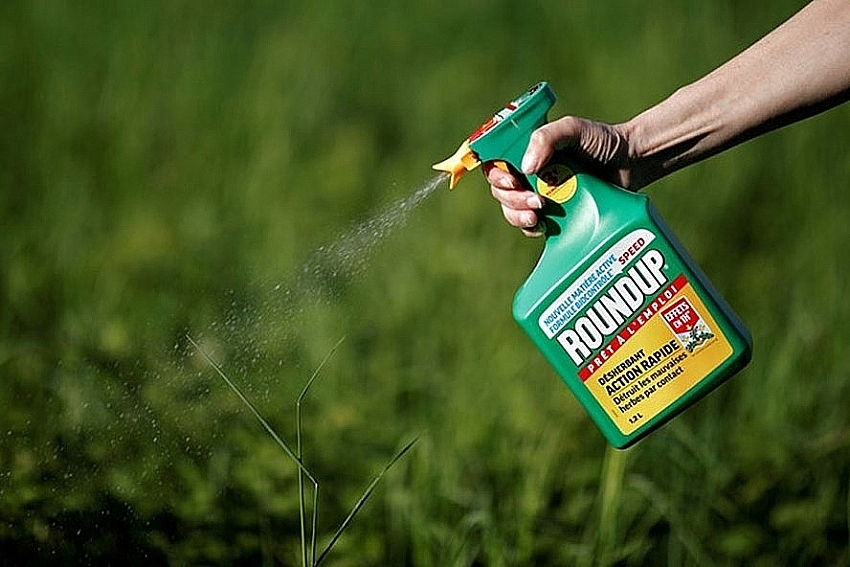Bayer AG’s stock sets seven-year record after favourable court ruling
 |
| Glyphosate, one of the most popular pesticides. Source: Laodong.vn |
The ruling is good news for the German company as Bayer AG faces thousands of similar lawsuits in the US. The company’s stock jumped 6.6 per cent at the Frankfurt stock exchange, a record rise in the past seven years.
Bayer AG’s Monsanto unit last week received a tentative ruling for a new trial on the $250 million punitive damages awarded by a jury to former school groundskeeper Dewayne Johnson who alleged the company's glyphosate-based weed killers, including Roundup, caused his cancer.
Last Wednesday, San Francisco Superior Court judge Suzanne Bolanos made a tentative ruling that could remove the $250 million punitive award on Monsanto and prompt a new trial.
She said the plaintiff "presented no clear and convincing evidence of malice or oppression to support an award of punitive damages."
Bolanos tentatively granted Monsanto's request for a JNOV—a judgment notwithstanding verdict, which is basically when a judge in a civil case overrules the jury's decision.
Bolanos gave attorneys on both sides until Friday to present responses before she makes a final decision.
But even if the judge denies Monsanto's request to drop the $250 million punishment, "the court would grant a new trial on the grounds of insufficiency of the evidence to justify the award for punitive damages," Bolanos wrote.
| Bayer issued a statement saying hundreds of studies indicate glyphosate, the key ingredient in Roundup, does not cause cancer. |
Two months ago, Dewayne Johnson won the landmark case against Monsanto, claiming the company's popular weed-killer Roundup caused his non-Hodgkin's lymphoma. Johnson is the first of more than 4,000 cancer patients to take Monsanto to trial.
The big question at stake was whether Roundup can cause cancer and, if so, whether Monsanto failed to warn consumers about the product's cancer risk.
The jury sided with Johnson on both counts and awarded him $250 million in punitive damages (to punish Monsanto) and about $39 million in compensatory damages (for Johnson's lost income, pain, and suffering).
However, last Wednesday, San Francisco Superior Court judge Suzanne Bolanos made a tentative ruling that could nix this $250 million punitive award and prompt a new trial.
As Johnson was the first cancer patient to take Monsanto to court, what happens with Johnson's case does not just affect him—it could set a precedent for more than 4,000 similar cases awaiting trial in federal or state courts.
Bayer AG, the company that recently acquired Monsanto, said it was pleased with the judge's tentative ruling. Bayer issued a statement saying hundreds of studies indicate glyphosate, the key ingredient in Roundup, does not cause cancer.
"The jury's verdict was wholly at odds with over 40 years of real-world use, an extensive body of scientific data and analysis, including in-depth reviews by regulatory authorities in the US and EU, and approvals in 160 countries, which support the conclusion that glyphosate-based herbicides are safe when used as directed and that glyphosate is not carcinogenic," Bayer said.
What the stars mean:
★ Poor ★ ★ Promising ★★★ Good ★★★★ Very good ★★★★★ Exceptional
Related Contents
Latest News
More News
- France supports Vietnam’s growing role in international arena: French Ambassador (January 25, 2026 | 10:11)
- Foreign leaders extend congratulations to Party General Secretary To Lam (January 25, 2026 | 10:01)
- Russian President congratulates Vietnamese Party leader during phone talks (January 25, 2026 | 09:58)
- Worldwide congratulations underscore confidence in Vietnam’s 14th Party Congress (January 23, 2026 | 09:02)
- Political parties, organisations, int’l friends send congratulations to 14th National Party Congress (January 22, 2026 | 09:33)
- 14th National Party Congress: Japanese media highlight Vietnam’s growth targets (January 21, 2026 | 09:46)
- 14th National Party Congress: Driving force for Vietnam to continue renewal, innovation, breakthroughs (January 21, 2026 | 09:42)
- Vietnam remains spiritual support for progressive forces: Colombian party leader (January 21, 2026 | 08:00)
- Int'l media provides large coverage of 14th National Party Congress's first working day (January 20, 2026 | 09:09)
- Vietnamese firms win top honours at ASEAN Digital Awards (January 16, 2026 | 16:45)

 Tag:
Tag:
























 Mobile Version
Mobile Version